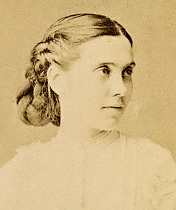The exquisitely beautiful, proud, yet also stubbornly self-destructive Nastasia Filipovna Brashkova in The Idiot was based on the equally fascinating figure of Polina Prokofyevna Suslova, who in addition to being mistress of Fyodor Dostoevsky was also a short story writer in her own rights. Not only was she the basis for Nastasia, Polina was the prototype for the vast majority of Dostoevsky’s great female protagonists, including Katerina in Crime and Punishment, Lizaveta Nikolaevna in The Possessed, both Katerina and Grushenka in the Brothers Karamazov, and the eponymous Polina in The Gambler. Much like Myshkin and Nastasia, Dostoevsky’s relationship with Polina was a painful and tumultuous one which ultimately resulted in lasting heartbreak for the novelist.
The two first met in 1861 when Polina was a 21 year old student attending a public reading by the 40 year Dostoevsky, who was at that time already a renowned writer and married to his first wife Maria who was at the time dying from consumption. Dostoevsky was enraptured by the attractive young woman and the two soon began a short but passionate affair. Polina repeatedly demanded the writer to leave his wife for her although when Dostoevsky proposed to her after his wife’s death, she turned him down. The relationship eventually ended in the spring of 1863 due to Polina seeing other lovers and because of Dostoevsky’s increasingly worsening gambling addiction, which has landed him in considerable debt.
In a letter to Polina’s sister, Nadezhda (who interestingly was the first Russian female physician and gynecologist), Dostoevsky wrote that she was a “great egoist. Her egoism and her vanity are colossal. She demands everything of other people, all the perfections, and does not pardon the slightest imperfection in the light of other qualities that one may possess”, and that “I still love her, but I do not want to love her any more. She doesn’t deserve this love …”.
When she was 40 years old, she married the 24 year old Vasily Rozanov, who wrote in diary that he fell in love with her at first sight and that “she is the most wonderful woman I’ve ever met”. Rozanov has the reputation of being one of the most controversial writers of his time who was known for his paradoxical and self-contradicting political comments and held Dostoevsky as his boyhood idol. Their marriage was an uneasy one as Polina often flirted with Rozanov’s friends all the while making public scenes of jealousy herself, she was dismissive of Rozanov’s work and left him on two occasions only to be forgiven and begged to return, saying “there was something brilliant (in her temperament) that made me love her blindly and timidly despite all the suffering”. She finally left him in 1886, after six years of marriage although she did not divorce him for another 20 years out of spite, thereby making all the children Rozanov had with his later partner illegitimate.
Even after their relationship has terminated, Polina’s memory never left Dostoevsky’s mind as evidenced by the numerous appearances of proud and selfish heroines and doomed love affairs which were all variations her and their brief time together until the very end of Dostoevsky’s writing career. In the book The Three Loves of Dostoevsky, the critic Mark Slonim described of Dostoevsky’s longing for Polina by saying “until his death he remembered her caress and slaps in the face. He was devoted to this seductive, cruel, unfaithful and tragic love.”

